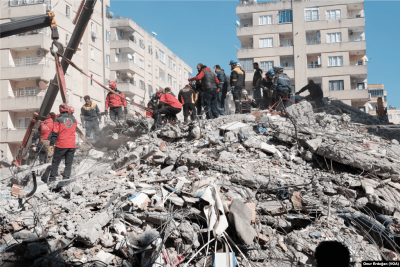
Three weeks have passed since the devastating earthquakes that shook Turkey, demolishing 10 municipalities and killing more than 44,000. One in every seven people in the country has been directly affected by this disaster, leaving many to wonder: Was the crisis avoidable?
Even as the death toll continues to climb, grief-stricken Turks are enraged by their government’s inadequate response. The late arrival of aid and poor coordination among rescue staff have contributed to a sense of hopelessness, with earthquake victims and volunteers seemingly abandoned by the authorities.
Compounding public anger is a sense that leaders in the Justice and Development Party (AKP) are failing to take responsibility. President Recep Tayyip Erdogan insists it was impossible to be prepared for an earthquake of this magnitude, despite evidence to the contrary.
The fact is, countless preventive measures were simply ignored. Before the 2015 elections, AKP candidates pledged to invest in search-and-rescue capabilities to reach any part of Turkey in less than 90 minutes. Then, in 2018, the party vowed to invest in urban renewal projects to make Turkey resilient to natural disasters. Neither of these promises was kept.
Instead, government neglect has made the country less safe. During its tenure, the AKP has issued nine zoning amnesties – forgiveness for building violations – that owners of nearly 300,000 buildings in the earthquake zone benefited from.
Lutfu Savas, the mayor of Hatay, one of the earthquakes’ worst-hit regions, predicted this deadly outcome. Two weeks before the February 6 disaster, the mayor told a TV journalist that damage would be extensive in the event of a major quake because his municipality’s requests for urban renewal projects had been stalled by officials in Ankara for more than five years.
As if to punctuate Savas’ premonition, a building that collapsed in Hatay was a government hospital in Iskenderun, which had been exempted from earthquake standards for more than a decade.
Anger and distrust toward those in power is justified. After the 1999 Izmit earthquake, which killed more than 17,000 people, the government imposed a tax to help guard against future losses. Between 2000 and 2022, a staggering US$38.4 billion was collected. Yet it remains unclear how that money was spent.
The government and its extended organizations, such as AFAD – the country’s disaster and emergency management agency – have a track record of incompetence.
During its two decades in power, the AKP government has made it a priority to hire people based on party affiliation rather than merit. This is clearly the case at AFAD, where most of the top jobs are held by loyalists.
For example, AFAD’s lead in the earthquake recovery, Ismail Palakoglu, has no relevant training or experience in the field. He graduated from a religious high school, holds a bachelor’s degree in theology, and pursued positions in Turkey’s Religious Affairs Directorate. Most of AFAD’s provincial directors share a similar career track.
AFAD is not only bad at hiring; it also mismanages its funds. In 2016, the Turkish Court of Accounts found that national and international donations to the organization had been improperly documented. AFAD was later ordered to establish a reliable and transparent accounting system, though it’s unclear if that directive was ever followed.
What is certain is that AFAD has a money management crisis. In 2022, AFAD cut its disaster response budget by 93% to cover 14 million lira (about $742,000) in compensation for the victims of another disaster, the Van earthquakes of 2011. This funding shortfall has hindered current relief efforts. Journalists in the region note that AFAD is either poorly prepared or completely absent.
This has left ordinary citizens to fend for themselves. One of the most coordinated volunteer networks is AHBAP, a non-profit organization founded in 2017 by Anatolian rock singer and public figure Haluk Levent. It’s run by volunteers and is active in 68 cities across Turkey. In January, AHBAP had 360,000 volunteers. Today, it has more than a million.
Levent has always been known for his public service. He took part in rescue efforts in 1999 and quietly donated money to schools and hospitals. His reputation has enabled AHBAP to secure gifts from some of the biggest names in philanthropy. According to MediaCat and Ipsos research, Levent has been Turkey’s most respected celebrity for four consecutive years.
Unfortunately, this troubles the government, which views the singer’s deeds as a criticism of its leadership. In recent weeks, Levent has been the subject of public smear campaigns, and the AHBAP website has been hit by hundreds of cyberattacks. AKP leaders have even claimed that Levent can’t be trusted with the millions of lira in donations his organization has received.
AHBAP and Levent aren’t the only victims of the government’s insecurity. After an earthquake survivor from Gaziantep published a video on social media showing how buildings built by the municipality were unsafe, an AKP mayor placed him under investigation.
Elsewhere, structural engineers working in the city of Osmaniye received death threats, while people who protested against a government visit to Diyarbakir were arrested.
As rescue operations come to an end, those in power must answer for their negligence. For too long, Turks’ safety has been taken for granted. Turkey will rise again, but the decisions on how it stands should not be made by the same people who enabled its fall.
This article was provided by Syndication Bureau, which holds copyright.

